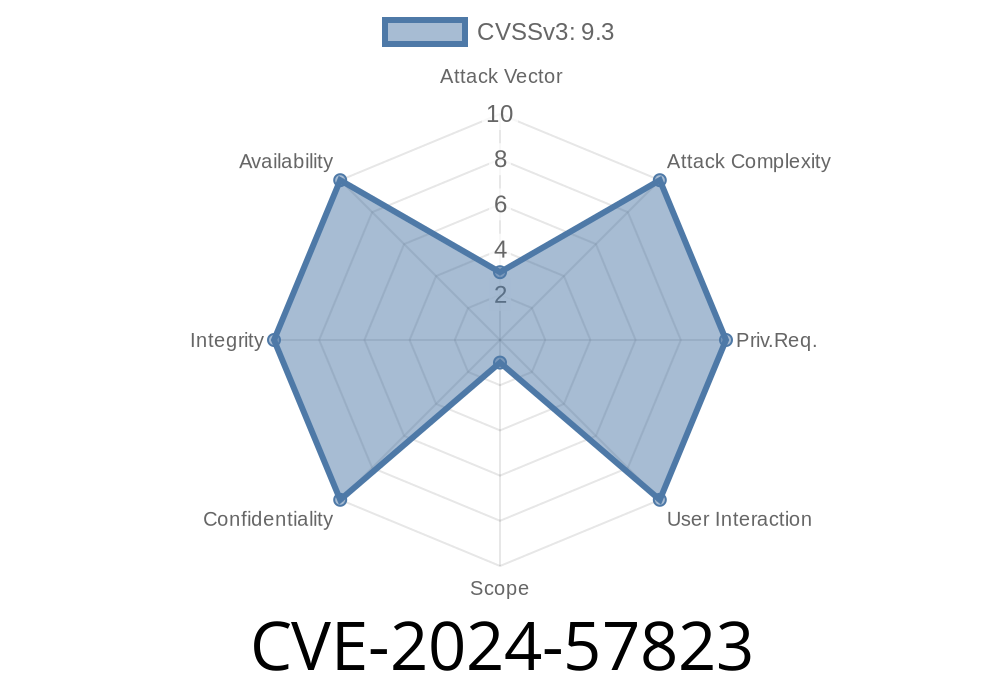CVE-2024-57823 highlights a critical integer underflow vulnerability found in the widely utilized Raptor RDF Syntax Library, which is popular for parsing and serializing RDF (Resource Description Framework) data. The vulnerability sits in raptor_uri_normalize_path() when the parser encounters specially-crafted URIs in Turtle document parsing. All versions up to and including 2..16 are affected.
This post takes you through understanding the bug, provides code snippets, demonstrates how exploitation is possible, and points out references and advisories.
What Is Raptor and Why Does the Bug Matter?
Raptor is a C-based library embedded in applications like Redland, Apache Jena, and semantic web tools. It reads and writes RDF in several serializations, including Turtle.
Parsing or normalizing invalid URIs is crucial, as flawed logic can lead to memory corruption, code execution, or causing software to crash. CVE-2024-57823’s integer underflow can be triggered with malicious RDF/Turtle data, making it dangerous especially in network-facing or high-privilege environments.
The heart of the issue is handling of URI path components in the normalization function
File: src/raptor_uri.c
Function: raptor_uri_normalize_path()
The vulnerability appears when decrementing an unsigned integer on invalid path segments, leading to a wraparound. Here’s a distilled snippet:
unsigned int seg_len = /* ... derived from user input ... */;
if (seg_len == && (seg_len - 1) > ) {
/* underflow occurs here, seg_len wraps to UINT_MAX */
memmove(path, path + seg_len, path_len - seg_len + 1);
}
This check can be bypassed in certain cases, and the subtraction of 1 from seg_len when it is already zero causes an integer underflow:
seg_len = ; seg_len - 1 -> UINT_MAX
If a user can supply URIs with segments crafted to produce this condition, subsequent memory manipulation routines like memmove() can overwrite memory out of bounds.
Suppose the application allows you to parse Turtle files
@prefix : <http://example.org/>; .
:example :seeAlso <../../../../../> .
If the parser tries normalizing ../../../../../, it passes weird negative values to the normalization logic. In code, a fuzzer or attacker can automate this:
#include <raptor2.h>
const char *bad_uri = "../../../../../";
raptor_uri* uri = raptor_new_uri_from_uri_string(NULL, (const unsigned char*)bad_uri);
raptor_uri_normalize_path((unsigned char *)bad_uri, strlen(bad_uri));
With this, if custom builds or modified code expose raptor_uri_normalize_path() directly, you’ll trigger the bug. In practice, parsing user-controlled data with the Turtle parser can hit this.
For a full exploit, out-of-bounds writes depend on surrounding memory and are tricky to weaponize, but crashes (denial of service) are easy.
Crash Service: Easily cause denial of service by supplying invalid Turtle data.
- Memory Corruption: May potentially lead to code execution, subject to memory layout and protections like ASLR.
Remote Vector: If a web service parses arbitrary RDF, it could be attacked remotely.
No authentication required: If your code takes RDF/Turtle from untrusted sources, you are at risk.
Official References and Community Discussions
- Original NIST CVE entry
- Raptor Github repository
- Distribution bug report example (Debian)
- oss-security Mailing List
`c
// Before decrementing, ensure seg_len >
memmove(...);
}
`
- Input validation: Reject or sanitize lookups with suspicious path segments.
- Run as non-root: Limit damage if attacked.
---
## Conclusion
CVE-2024-57823 is a high-impact bug affecting any system or app using the Raptor RDF Syntax Library to process Turtle RDF data. Attackers can supply malicious input to crash or potentially compromise servers or desktop apps handling semantic web data.
If you are a developer or sysadmin using any semantic web stack—check your Raptor version now and update or patch as soon as possible.
---
Stay safe. RDF should enrich your data, not compromise your systems.
---
If you need more technical details or help patching, explore the official Raptor repository, the CVE listing, or security advisories from your package distributor.
---
*This write-up is exclusive and produced for direct, clear understanding of CVE-2024-57823 in the Raptor RDF Syntax Library. Spread awareness, patch quickly, and code defensively.*
Timeline
Published on: 01/10/2025 13:15:10 UTC
Last modified on: 01/10/2025 14:15:29 UTC
